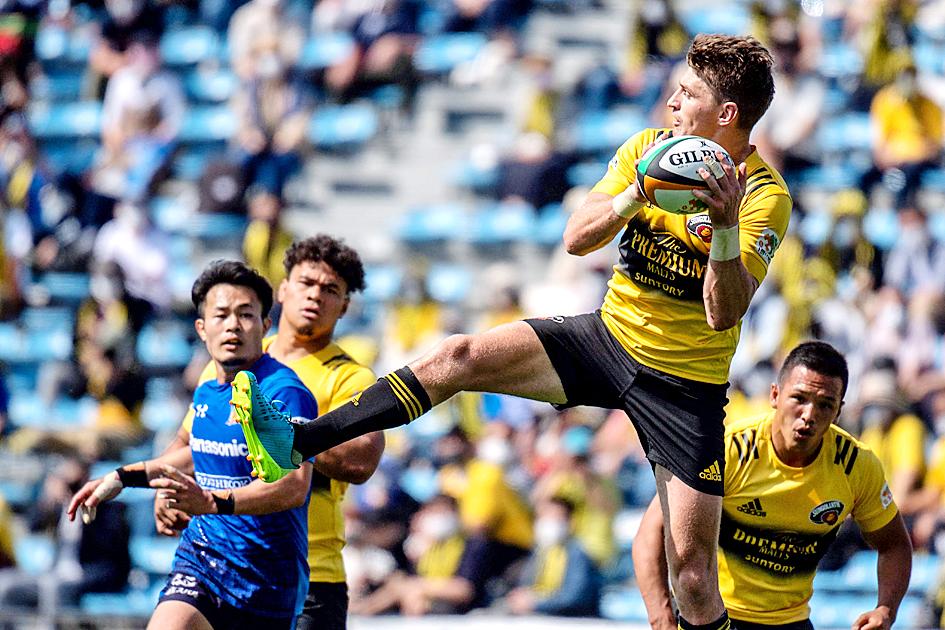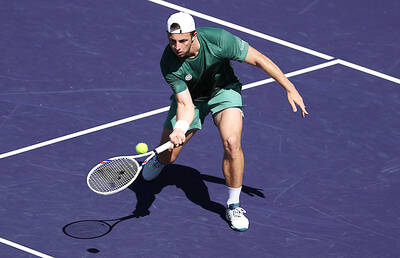Japan’s rugby union season starts tomorrow with big ambitions, tongue-twister team names and a rebrand that has left some fans wondering which version of the sport they are to be watching.
Japanese rugby chiefs want to create “the best league in the world” with 2019 World Rugby Player of the Year Pieter-Steph du Toit, and Australians Samu Kerevi and Quade Cooper among the foreign talent on show.
Organizers also plan to invite southern hemisphere teams to play Japanese clubs in special “cross-border matches.”

Photo: AFP
However, the rugby union competition’s new name — Japan Rugby League One — has confused some with its apparent reference to the 13-a-side version of the game.
Others have been left tongue-tied by rebranded team names such as NTT Communications Shining Arcs Tokyo-Bay Urayasu and NTT DoCoMo Red Hurricanes Osaka.
The three-tier Japan Rugby League One — which replaces the old Top League — is to launch with a showpiece opener at Tokyo’s Olympic stadium.
“When the opportunity came across, it was something I didn’t think twice about,” said Springbok flanker Du Toit, who has joined Toyota Verblitz.
“I think rugby at the moment in Japan is a really fast and highly skilled game, and that’s probably the way the game is going in the future,” he said.
Du Toit is one of a number of high-profile international players who have moved to Japan in the past few years.
Australia captain Michael Hooper and New Zealand’s Beauden Barrett both had stints there last season, while Rugby World Cup-winning Springboks Malcolm Marx and Willie le Roux have returned for the new campaign.
Japan Rugby League One chief operating officer Hajime Shoji said that teams would continue to lure top overseas players, who are attracted in part by the salaries on offer.
Plans are also afoot to invite southern hemisphere sides to Japan to play the league champions, he said.
“One thing that is different from what went before is that we’re looking outwards to the rest of the world and trying to connect,” he said.
Japanese clubs’ chances of signing more big names have been boosted by Australia’s loosening of the so-called “Giteau Law,” which bars overseas-based players from representing Australia unless they have appeared in at least 60 Tests.
A slight relaxation of the rule means more players are eligible to play for the Wallabies while plying their trade with teams overseas.
Kerevi, Cooper and Sean McMahon all played for Australia last year while keeping their lucrative Japanese club contracts.
While eye-catching signings have grabbed the headlines, the biggest change for Japan’s new league is the way the clubs operate.
They were previously run as divisions of corporate behemoths such as Toyota and Panasonic, and league matches were organized by the Japan Rugby Football Union.
Now, clubs are responsible for their own matchday operations and finding sponsors, and must play their games in a designated “home area,” taking steps toward finding a permanent stadium.
Clubs have also taken on new names in a bid to move them away from their corporate roots and establish ties with local communities.
The launch of the new league was delayed by the COVID-19 pandemic, but Gates believes it is not too late to regain momentum.
“I think the world has seen the growth of the Japanese national rugby team,” he said. “I think now they’re hoping the domestic competition can also make that step up.”

Tallon Griekspoor on Friday stunned top seed Alexander Zverev 4-6, 7-6 (7/5), 7-6 (7/4) in the second round at Indian Wells, avenging a devastating loss to the German at Roland Garros last year. Zverev, the world No. 2 who is heading the field of the prestigious ATP Masters event with No. 1 Jannik Sinner serving a three-month drugs ban, is the first Indian Wells men’s top seed to lose his opening match since Andy Murray in 2017. It was a cherished win for Griekspoor, who had lost five straight matches — including four last year — to the German. That included a five-setter

Five-time champion Novak Djokovic on Saturday tumbled out of the Indian Wells ATP Masters, falling in his first match to lucky loser Botic van de Zandschulp as two-time defending champion Carlos Alcaraz advanced. “No excuses for a poor performance,” 24-time Grand Slam champion Djokovic said after 37 unforced errors in a 6-2, 3-6, 6-1 defeat. “It doesn’t feel great when you play this way on the court,” he said. “But congratulations to my opponent — just a bad day in the office, I guess, for me.” Djokovic is just the latest in Van de Zandschulp’s string of superstar victims. He

Manchester United on Thursday settled for a 1-1 draw with Real Sociedad in the first leg of their Europa League round-of-16 tie. United led on Joshua Zirkzee’s goal in the 58th minute, but the hosts equalized 12 minutes later after Bruno Fernandes’ hand ball and Mikel Oyarzabal sent Andre Onana the wrong way from the penalty spot. The Europa League could be a way for United to finish the season with a trophy after crashing out of the FA Cup on Sunday. A spot in the quarter-finals is to be on the line at Old Trafford in the second leg on Thursday next

Paris Saint-Germain on Tuesday held their nerve to beat Liverpool 4-1 on penalties and reach the UEFA Champions League quarter-finals after their tie finished one-apiece on aggregate, while Bayern Munich saw off Bayer 04 Leverkusen to complete a 5-0 win over both legs. Lamine Yamal and Raphinha fired Barcelona into the next round as the Catalans bested SL Benfica 3-1, and Inter booked a last-eight meeting with Bayern by seeing off Feyenoord 2-1. At Anfield, Ousmane Dembele netted the only goal of the night as PSG bounced back from Liverpool’s late winner last week to force the tie to extra-time and penalties. Maligned